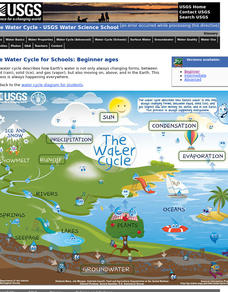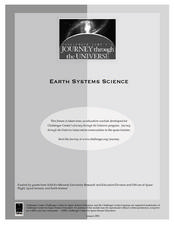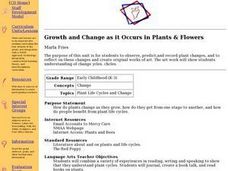Curated OER
Conservation in Small Spaces: Butterfly Life cycles
Students discuss ways that butterflies and moths change during their lifecycles, observe caterpillars, and explore how their different body parts work.
US Geological Survey
The Water Cycle for Schools: Beginner Ages
Explore a day in the life of a water droplet. An interactive infographic helps scholars learn how water cycles work from precipitation all the way around to condensation. Learners hover over each step of the cycle to read more as they...
Curated OER
Plankton in the Air
Here is a lab activity adequate for use with any full lesson on environmental factors that shape animal adaptations or marine animal characteristics. Pupils will discuss the role plankton plays in the environment and filter-feeding...
Chicago Botanic Garden
Plant Phenology Data Analysis
Beginning in 1851, Thoreau recorded the dates of the first spring blooms in Concord, and this data is helping scientists analyze climate change! The culminating instructional activity in the series of four has pupils graph and analyze...
Curated OER
Butterfly, Butterfly: Teaching Vocabulary
Kindergarteners practice new words through listening to and reading the science book Butterfly by Jenny Feely. The teacher will first choose words that are essential for understanding the text. Then, using pictures in the text, pupils...
Curated OER
Name That Leaf
Take a walk through nature with a science experiment about leaves. Third graders use a branching diagram to group attributes of certain kinds of leaves, such as oak, pine, and chestnut. For extra practice, they can collect leaves and...
Curated OER
Earth's Heavenly Treasures: Hummingbirds
Young ornithologists watch an informative video and use the Internet to gather data about the life, size, habitat, and migration of hummingbirds. The interdisciplinary lesson includes activities that target art, science, math, and...
Curated OER
Our Natural Resources
Your class will learn about natural resources and man-made items and differentiate between them. They chart resources from seven pictures and explain how each natural resource is used.
Curated OER
The Properties of Water: "Dead Or Alive"
Young scholars study the water cycle and create a booklet entitled: "Discover the Wonder of Water" They observe and record data regarding evaporation, condensation, and precipitation and how water moves from a solid to a liquid to a gas....
Science 4 Inquiry
The Yin and Yang of Photosynthesis: Day vs. Night
Floating fragments of elodea can grow even without roots. Young scientists use eldoea plants to observe the oxygen production from photosynthesis. They study the difference between having access to high amounts of light and low amounts...
Curated OER
Sun Seeking Plants
Pupils investigate the story "The Tiny Seed" by Eric Carle. This story is used to introduce the children to the concept that seeds change and grow into plants when conditions in the environment including temperature, light, water and...
Curated OER
Let it Grow!
Students explain the relationship of plants and animals in the environment. They name the basic requirements for plant growth and define the terms photosynthesis, stomata, chlorophyll and xylem.
Curated OER
Berenstain Bears: Grow It
Second graders read several books and complete an activity that coincides with each book. i.e. They read 'Berenstain Bears: Grow It' by Stan and Jan Berenstain and then decorate a flower pot, plant flower seeds in it and record their...
Curated OER
Earth Systems Science
Students perform experiments designed to grow plants and bacteria in a controlled environment. For this ecosystems lesson students investigate varying conditions for growing plants and bacteria.
Curated OER
Where do Plants Get their Food?
In this where do plants get their food worksheet, students design an experiment that will disprove the idea that plants obtain their food from soil. Students will set up their experiment and design a data table that will record data over...
Curated OER
World Climate Growing Zones
Young scholars create a map showing where crops would be grown around the world. In this crops lesson plan, students show how the world climate would produce different parts of the world at different times. Young scholars fill out...
Curated OER
Carnivorous Plants
Young scholars examine how carnivorous plants get their nutrients from animals. In this food web lesson students examine how the plants attract their prey and are given many onilne sources to research.
Curated OER
Growth and Change as it Occurs in Plants and Flowers
Students work together to observe plants and flowers through their life cycle. In groups, they make predictions and record changes in a journal. Using this information, they create their own original artwork and discuss the plants life...
Curated OER
How a Seed Grows: And Who Grows It
Second graders explore botany by viewing video clips in class. In this seed growth lesson plan, 2nd graders identify the types of seeds that grow specific plants and what the optimal conditions are for growing seeds. Students view a...
Curated OER
Out and About: Plants
Students examine plants. In this hands-on science lesson, students visit the Royal Botanic Gardens, the Eden Project, and Nature's World online or in person to investigate plants and gardens.
Curated OER
Flowering Plants
Pupils conduct online research to investigate gardening and landscaping tips. They determine how they can help beautify their homes and neighborhoods.
Curated OER
Plants and Shadows
In this science worksheet, students design an experiment to measure the effects of sunlight exposure upon plants while comparing the amount of shade as a correlation.
Curated OER
Seed Plants: Gymnosperms
Students identify what makes up a seed. In this gymnosperms lesson students identify conifers and explain how they reproduce and what the importance of gymnosperms are.
Curated OER
Fields, Meadows, and Hedgerows: Trees, Bushes, and Plants
In this trees, bushes, and plants worksheet, students gather facts and answer short answer questions about trees, bushes, and plants. Students complete 8 questions total.

























